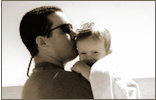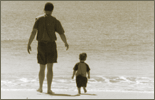Goodness and Courage
I was up at 5 a.m. this morning, and heard on the BBC that Saddam Hussein had been hanged not long before. I found myself initially exultant, but then I began to think about whether it matters. This is because the thought entered my mind that people like Hussein are simply extensions of the ignorant, murderous tribal impulses that seem to have plagued man from the beginning.
I began to wonder whether we lie to ourselves when we make a big show of putting someone like Hussein on trial, as if he is an aberration. We want to believe that he is exceptionally cruel by dint of personal qualities, as opposed to exceptionally successful at exercising a widespread instinct for cruelty. How many men raised in the brutal tribal mentality that governs much of the world would not do the things Hussein did, given the opportunity?
The BBC reporter called him "President" Hussein. I love when people refer to some dictator as a president, or leader, as if there had been debates and discussion, followed by a free choice among competing candidates. It's even more precious when the same euphemism-spouters imply that George Bush, Jr., ought to have an asterisk by his title.
But then maybe an election isn't that important. I always felt a special connection to President Ford, because when I was eight years-old my grandmother took me to the little Winston-Salem airport, and we stood in a long line to greet him, and when he passed by she told me to stick out my hand so I did, and he wrapped his gigantic hand around mine and shook it. Here was someone who ascended to power without being elected president or vice-president, and yet he behaved with relative honor.
I like that he pardoned Nixon, even though I'm not a fan of much Nixon did beyond skewering Alger Hiss, which probably shouldn't count because he did it as a congressman. I like that Ford pardoned Nixon, because he did it knowing people would howl. He knew it would damage any hope he might have of being elected president, and yet he did it anyway, because he believed it was right. I don't think that exists much any more, the doing of something unpopular simply because it is right.
Doing the unpopular is certainly rare in public life -- can you imagine Joe Biden or John Kerry or Trent Lott so much as tossing out the opening pitch at a Little League game without first poll-testing to see which style of pitch is most popular with swing voters? But unpopular action is rare in private life as well, as evidenced by a Saturday afternoon trip to your local mall, where you will witness repeated variations on the theme of parents pleading with their children to behave, or simply ignoring bad behavior, because to confront it might plummet their standing in the kiddie polls. Most of us are guilty, it seems, of giving bread and circuses to our constituents at least once in a while.
This is why the two elected officials I admire most right now are Joe Lieberman and George Bush, even though I probably disagree with much if not most of the policies they seek to advance. I admire them because, at least some of the time, they try to do what they believe is right, regardless of what people think. Though he's no longer in office, I admire former congressman and 9/11 Commission member Tim Roemer for the same reasons. He has goodness in him. He has the courage to pursue what he believes is good.
One might argue that Hussein, too, pursued a worldview -- however twisted -- because he believed it was right. The difference turns on the fact that he was in fact evil, and his worldview was evil. Shove aside all the sophistry and nonsense that attaches itself to nihilistic post-modern political theorizing, and you cannot escape the fact (if you have a brain in your head) that the political goals of some people are profoundly, undeniably evil. The raw brutality with which Hussein pursued his political goals reminds us that the concept of evil can't be banned from the public arena without denuding our discourse. No matter how much the chattering classes mocked the notion of an Evil Empire, or an Axis of Evil, both observations were true, and there is something deeply admirable about people who are willing to say such true things.
Courage and goodness. When I think about the content of those terms, the future appears hopeless indeed, because courage and goodness in our public sphere seem to be rare and dissipating qualities. We have only ourselves to blame, of course, because we wallow in ignorance and we worship the ignorant, and because we are loathe to suffer discomfort, all of which means that we find ourselves repeatedly empowering and rewarding immoral, gutless panderers.
Later this morning on NPR I heard an interview with a man who studies rats. The journalist asked him what he's learned from his study of rats. He responded that rats, like people, are creatures of the earth. He said that rats mostly want the same things that people want. Rats don't like people any more than people like rats. And so on. It reminded me of James Clavell's King Rat, about inmates of a WWII prisoner of war camp.
I wasn't sure if the rat scientist's point was to elevate the rat or reduce humanity. Certainly rats don't worry over raising their children to be moral creatures, or leap onto grenades to save their fellows, but neither do they torture their enemies. Rats are capable neither of goodness nor evil. Man is capable of both, but he seems to revel in the latter. He redefines it, builds a religion or a moral code to support it, and then he revels in it. And he abhors, with especial hatred, the good or courageous person who says: "what you do is evil."
Yet there persist those few with courage and goodness. Sometimes I fear that there are fewer of them than we think, and more latent Husseins and Goebbels and Pol Pots than we care to believe. The heart of man is a terrible dark thing, a fact to which I can attest after careful study of my own. I draw hope from what Holocaust survivor Viktor Frankl wrote in Man's Search for Meaning:
"Our generation is realistic, for we have come to know man as he really is. After all, man is that being who invented the gas chambers of Auschwitz; however, he is also that being who entered those gas chambers upright, with the Lord's Prayer or the Shema Yisrael on his lips."
They say Hussein muttered a prayer before his neck was snapped. I suspect he is surprised to find himself in Hell. I suppose most of its recent inhabitants are, because we have lost the courage, as Unabomber victim David Gelernter noted, "to call evil by its right name." And yet it endures, and we endure it, and occasionally we put someone on trial, as much to tell ourselves that evil is not in us as to exact justice. Yet as Solzhenitsyn observed, the line between good and evil "divides the heart of every man."
The encouraging thing about that idea is its suggestion that the kernels of goodness and courage reside within each of us. Though we have a nasty habit of choosing evil and cowardice, we don't have to. We don't have to do wickedness -- the grave or the petty -- any more than we have to do good. It doesn't have to be this way, in other words.
It doesn't have to be this way. We can't change the world, and for every Hussein we hang there will be another thug, and another after him. We can't fix the world by ourselves, but we can change the terrain of our hearts. So I'll make a deal with you. In 2007, and all the years I have left, I'll try to live with more goodness and courage, and you do the same. Because it doesn't have to be this way, you see. It can be better. We can be better.
I pray for you a peaceful end to this year, and a new year with a little more courage, and a little more goodness.
Posted by Woodlief on December 30, 2006 at 11:23 AM






















